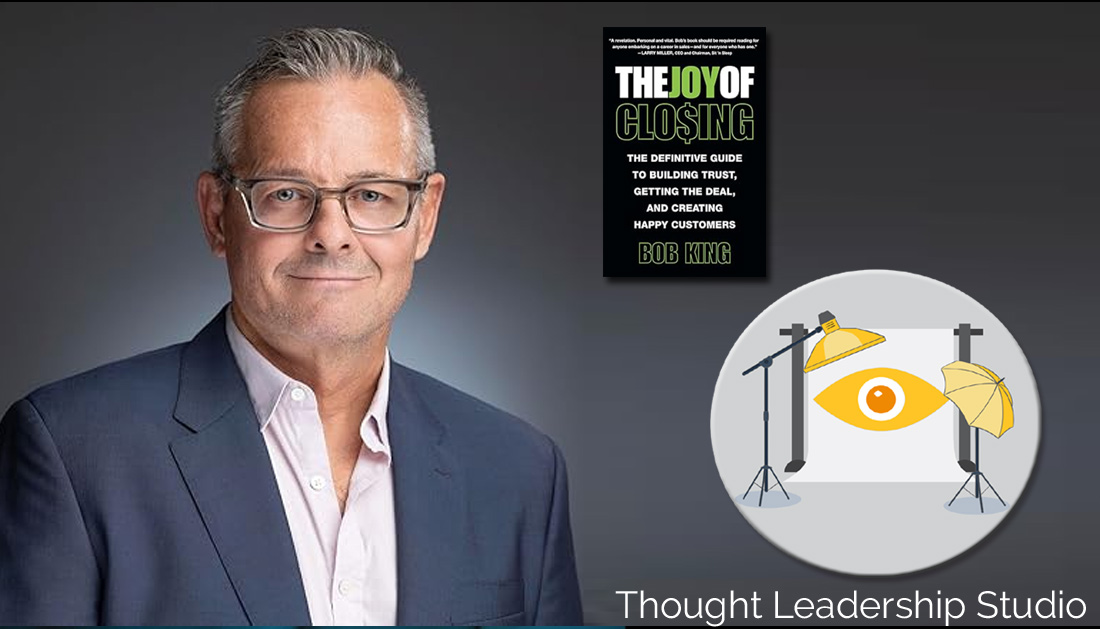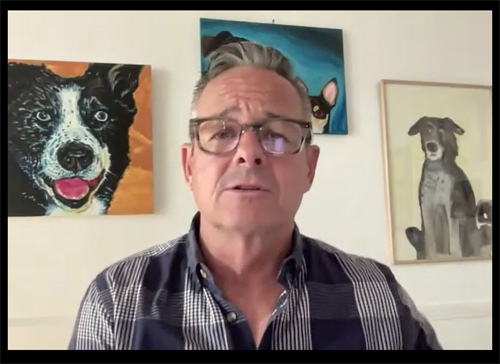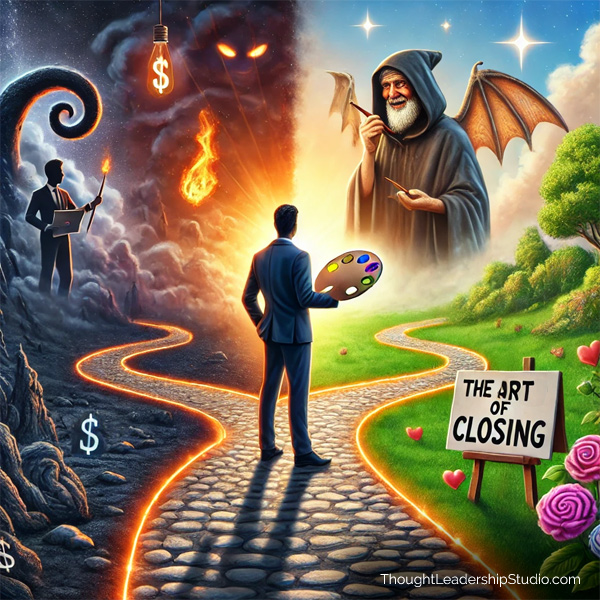Thought Leadership Studio Podcast Episodes:
Closing the Deal with Bob King
Episode 78 - Mastering the Art of Sales: Bob King on Ethical Closing Techniques, Building Customer Trust, and Transforming Sales Teams

#authors, #coaching, #communication, #consulting, #customerexperience, #entrepreneurship, #influence, #interviews, #interviews, #marketing, #persuasion, #sales, #strategicthoughtleadership, #thoughtleadership
Or Click here to listen or subscribe on appWhat this episode will do for you
:- The Art of Closing Sales: Learn from Bob King’s extensive experience as he shares his belief that closing is an art form and provides techniques to master it.
- Ethical Sales Tactics: Discover the difference between unethical sales practices and ethical approaches that prioritize the customer’s needs.
- Creating Urgency in Online Marketing: Explore how the principles of closing can be applied to online marketing to create urgency and engage customers effectively.
- Belief and Commitment in Sales: Gain insights into the role of belief and commitment in closing sales successfully and how these principles drive positive outcomes.
- Consulting and Coaching Success: Learn about Bob King’s journey in coaching and consulting, including his strategies for transforming sales teams and enhancing performance.
Bob King.
In this episode, I'm thrilled to introduce Bob King, a master of closing sales.
How is closing relevant to Strategic Thought Leadership (STL)?
Strategic Thought Leadership is about leveraging positive influence to inspire and guide others to embrace a fresh perspective. Embracing a fresh perspective is analogous to a purchase decision in the realm of sales, so this translates to leveraging Bob's philosophy of impacting others with integrity as well as fostering trust through techniques and beliefs that put the recipient's needs at the forefront.
Bob King, a renowned author, closing coach, filmmaker, and sales expert, believes closing is an art form. His book, The Joy of Closing, shares strategies and a perspective shift that makes sales a craft anyone can master. Bob's diverse background includes consulting with various sales teams and his directorial debut at the Sundance Film Festival.
In our conversation, Bob emphasizes working with customer resistance and providing genuine value, highlighting ethical sales tactics that prioritize customer needs. We explore the parallels between traditional sales and online marketing, discussing how closing principles can enhance digital strategies.
Bob also shares insights from his coaching and consulting business, offering three key recommendations for entrepreneurs and thought leaders at the end of the interview.
Some of Bob's coordinates:
Curated Transcript of Interview with Bob King
The following partial transcript is lightly edited for clarity - the full interview is on audio. Click here to listen.
Chris McNeil: I'm Chris McNeil, with Thought Leadership Studio and I'm sitting here across Zoom with Bob King, who is an author, closing coach, filmmaker, and sales superstar. With his book, The Joy of Closing, Bob offers not just strategies, but a perspective shift that sales is a craft that can be mastered by anyone with the right tools, equipping readers with everything from nuanced negotiation tactics to simple yet effective closing techniques that make selling an art form.
His directorial debut, Psycho Beach party, premiered at the Sundance Film Festival and was still on the staff favorite shelves when the last video rental store was shut down, Bob consults with sales teams and sales professionals of all types from retail to in-home sales to business to business, bringing one call magic to pitches, curing slumps, boosting team performance, and turning total strangers into happy customers often at the first meeting. That's impressive. Welcome Bob.
 Bob King: That's me. Hey Chris. Thanks for having me.
Bob King: That's me. Hey Chris. Thanks for having me.
Chris McNeil: Great to have you here. So your background is fascinating, your perspective is fascinating. As we were talking about before we started recording, I'm very fascinated by your approach to closing, having been in a business that was very closing oriented in the past and having spent a lot of time myself in trying to refine it to the nth degree.
Transforming Sales into an Art Form
So I share your perspective that it's an art form. What led you to that point of view? Did you have a shift or a certain event or pivotal moment that set you on this path?
Bob King: It was more of a series of events. The first 40 pages of my book, the Joy of Closing, really detailed my journey from person who was interested in how a con worked to a successful closer and someone who could train others. And that journey, it started with curiosity and the fact that they paid $1,200 to train me to sell solar power by a person that I knew was up to no good, but I just wanted to know I love the Sting and the Lady Eve and Dirty Rod and scoundrels, and I just always wanted to know how that works.
And I found out, and really it's just engaging the customer's greed. And I was trained in those hard old school tactics, but along the way, what you have to do to make that successful is a very successful streamlined presentation that takes that customer on an emotional journey.
 And then in that company we use greed to close them. But what I came to find out is that when you're with a company that the customer's not going to regret that decision and you're not ripping them off. You still need to close them. You still need to work with their resistance and to get them something they want.
And then in that company we use greed to close them. But what I came to find out is that when you're with a company that the customer's not going to regret that decision and you're not ripping them off. You still need to close them. You still need to work with their resistance and to get them something they want.
And the magic in that was belief, really committing to the idea that moving forward today was the very best thing for the customer, for my company and for me. And I wanted to share that journey and also those skills with a wider audience. And that's why I wrote a book.
Chris McNeil: That's awesome. I'm picking up a couple of things that I think would be really interesting to dive deeper into. One is the skillset, the toolbox on that level, but the other is the belief system that this is the right thing, I think you said for me, for the customer and for the company.
Bob King: Customer first.
Chris McNeil: Customer first, absolutely
Sales Strategies that Prioritize the Customer
Bob King: Then the closer. But really it is all three because I was in the film business for 19 years. I was hired five or six times depending on how you look at it. And when I started working for this first company, what was beaten out of me by this guy who kind of mentored me in closing was, I'm so sorry, lemme just drink a tip of tea. What was beaten out to me by this guy was all the ways that I sabotaged the deal by either making it about me or coming across as untrustworthy or not putting the customer first.
And in the case of that first company, a lot of times it was the illusion of putting the customer first. But in reality, when most people are selling something they believe in, but they just don't have that little extra belief in themselves, belief in their ability, in order to be a closer, they're just a salesperson sitting behind a cash register, reading their horoscope, saying, can I help you?
When they could be that person who takes an interest in their customer, helps 'em find something they want, maybe they spend a little more than they thought they would, but they have confidence in what they purchased and it leads to much greater satisfaction. And most importantly, it doesn't waste their time because when you don't close a customer, probably you're a really good presenter. Most salespeople are really good presenters and they're going to do a good job of making the customer want that product.
 But if you don't close them, then they're this little lamb going out in the world knowing they want something and maybe the competition comes in and they're just a better closure than you are. And so they sell 'em a worse product for a worse price. Not because the customer made an analytical decision, but just because you didn't do your job. So I think really to be a very effective salesperson, you got to learn how to close. And so there's a stigma around it that is totally misplaced, a lot of which has to do with the way books on closing and guys like me tell people how to do it.
But if you don't close them, then they're this little lamb going out in the world knowing they want something and maybe the competition comes in and they're just a better closure than you are. And so they sell 'em a worse product for a worse price. Not because the customer made an analytical decision, but just because you didn't do your job. So I think really to be a very effective salesperson, you got to learn how to close. And so there's a stigma around it that is totally misplaced, a lot of which has to do with the way books on closing and guys like me tell people how to do it.
And what I see out there is a lot of what I learned how to do when I was working for scoundrels and not what I came into practicing when I was working for the good guys.
Chris McNeil: Interesting. And what's the difference between the scoundrels and the good guys in terms of how they see the customer?
Bob King: Do you close that customer because it's good for you or do you close that customer because it's good for them? If I have a product that they're going to regret buying or a company that they're going to regret working with, I'm closing them because it's good for me. I get a faction check out of it. Ultimately that's a very shallow experience and I like to sleep at night.
And so when you go to a company where they're not going to regret it, what the human nature thing is, well, now I don't need to do that. But you still do need to do that. You still need to work with their resistance. Closers are agents of change, and in order to get someone to embrace change, you've got to rough 'em up a little bit. You have to take 'em on an emotional journey. And so the other thing that I wanted to put in the book was a how to guide to prompt a one-call close or at least make the very best impression and have the very best chance for success at the first meeting.
Some industries I now consult for a lot of B2B customers and things like that where there's literally no way to close them at the first meeting, but you only have one chance to make a first impression. You only have the element of surprise one time. And if you really want to create desire in that customer, there's just a lot of things that one call closers do that normal salespeople don't, that I thought would be very beneficial to, especially B2B customers that oftentimes don't even really have a pitch.
So I put that all in the book and if people want to explore more, you and I can explore it more what those steps are, seven steps in a forecast is what I call it. Absolutely. But you need to do all that, right, and then close them. And then the closing chapter is the longest chapter in the book.
It's 13 closes and no 13, no 10 objections and 13 closes. And they are interchangeable because there's no anybody that tells you, oh, when the customer says this, you say this is giving you really bad advice because what you really need to do is meet them where they are and respond in a way that builds intimacy and trust.
So maybe they'll tell you what's really going on, and then once they do that, if you can speak to them and be there with the customer, it's a very intimate experience and a really exciting experience and a really rewarding experience because you're going to earn a lot of business that way, but also because you're really providing a service, you're being of service to that customer in a way that very few people in your position are able to do.
Creating Urgency in Sales
Chris McNeil: Absolutely. And to the listener and to follow where I'm going with this, I'm seeing all the ways this also applies. A lot of these same principles apply to online info, what we talk about in this podcast, taking the customer's point of view, if you're developing content and you want to persuade people and you're not taking the customer's point of view, they're not going to engage with it.
You're not going to have that rapport with your content and being an agent of change, leading them through an emotional journey, like over a bridge where you undermine the side that they're on, you build up the side you want to take them to. So you get that propulsion across the bridge of change ...
Bob King: Yeah, I call it feel the pain. It's making them feel the pain.
Chris McNeil: Yeah.
Bob King: And I try and do it educationally. I mean, the one thing that I added I think to the world of sales is this idea of the three reasons, which is in the field of pain chapter or step. And it's basically going over the three reasons why people, whatever it is you're selling or the change that you're creating, and the first one's always money, even if it's not a product that provides financial benefit, you still want to highlight that it's a product that's going to increase in price over time or some doing it now or making this choice, adopting this plan that I'm suggesting you adopt is going to somehow benefit you financially.
 You always want to create that. That's the number one reason people do anything. The second one is feels good. There's always a feel good aspect to any purchase, and the more you talk about it, the more the customer's going to want it. The point of a one call close is to create a limbic brain decision, not an analytical one or a lizard brain one. And so you have to make them want it. And so you talk about the way that that feels good and solar, it's save the polar bears powering your home with green clean energy feels better and you're going to use more power because of it. So we need to build a little bit bigger systems now, which is all true.
You always want to create that. That's the number one reason people do anything. The second one is feels good. There's always a feel good aspect to any purchase, and the more you talk about it, the more the customer's going to want it. The point of a one call close is to create a limbic brain decision, not an analytical one or a lizard brain one. And so you have to make them want it. And so you talk about the way that that feels good and solar, it's save the polar bears powering your home with green clean energy feels better and you're going to use more power because of it. So we need to build a little bit bigger systems now, which is all true.
I don't know what's going on with my throat and I apologize. Third reason is timing. And this is real gold because when you can talk early on in a meeting about reasons for going forward today without making it like, Hey, we're having the sale, do this.
Now you're talking about real world conditions. Why going meaning regulatory changes for solar is often one of them, or subsidies running out or things like that. Or for insurance for instance, your birthday comes at the half year point for a lot of insurance companies and you can talk to the customer about it can be specific to the customer, but also educational about your industry.
There's lots of other, no matter what you're selling, there's always reasons that doing this now is a benefit to the customer. And you want to get them focused on that, not in the context of like, Hey, let's do this, but in here, this is just what's going on and this is why other people are doing it now it's a more relaxed kind of pressure that you're applying, but it gets their head thinking about urgency and feeling like they need to do it if you're context of feeling the pain of their current situation.
So that's the three reasons - it's kind of my contribution to the world of sales. That and taking the stigma out of closing, which is I think the greater contribution.
Inoculating Against Objections
Chris McNeil: That's a big one. Then you're impacting people on the level of beliefs: what they think closing is and what it's all about. And it's all about the intention of the end result, isn't it, for it is customer first as you said, but as I'm try and follow you through the money conditions, the time conditions, the emotional reasons for the sale, you're coming from a standpoint of inoculating against objections instead of having to cover them when they come up later. Correct? Am I following that?
Bob King: Well, it depends on what you mean by objection. An objection is to me usually a lie that the customer tells you about why they're not going to make a decision today. And they don't know they're lying. They're not like, oh, how am I going to lie to this guy?
 But when you're in that, the moment you ask for, the moment you present, price is when closing, the actual closing part starts and it's a different, this is when you stop talking more than you talk. So you present price, you stop talking and they're going to say something. And what they're going to normally tell you is some lie about why they can't make a decision today. And that's generally speaking what objections are.
But when you're in that, the moment you ask for, the moment you present, price is when closing, the actual closing part starts and it's a different, this is when you stop talking more than you talk. So you present price, you stop talking and they're going to say something. And what they're going to normally tell you is some lie about why they can't make a decision today. And that's generally speaking what objections are.
There are such things as conditions, which is a real reason they can't go forward with you today is maybe it's a B2B thing and they need approval of 17 other people, but that doesn't mean they can't commit to presenting it. Even that is very, there are nuances within that which you need to be on. The lookout for closing is you have to be very committed. That's why I say if you don't start with the idea that moving forward today is the very best thing for your customer, for your company, and for you, everything you're doing is multiplied by zero.
And when you multiply anything by zero, that's zero. So you have to start with that idea, and when you believe that your response to their objection is going to be much different than if you're just looking for the nice way to not close them today because it's not your fault. So if you think of a condition of an objection as a condition, then I'm off hook as a closer, but you're just basically wimping out, if I had to use a phrase.
Modeling Success: How Bob King Trains Sales Teams
Chris McNeil: And you do consulting and training around this, correct?
Bob King: There's one thing that's come out of my book. I haven't sold a ton of books, but my demands on my skills as a closing coach and a sales consultant have been awesome, and I love it. I get to figure out how to work with different kinds of sales teams and different kinds of customers and different products, but it's all really the same.
The pitch part is, and I love when salespeople don't think they have a pitch. That's the other thing. A lot of salespeople, especially younger salespeople, they get this weird stigma around, I mean, forget about the stigma around closing, which is hilarious, but the stigma around pitching is even a thing. They'll go, oh, I don't have a pitch. And then you find out, well, their pitch is they ask a million discovery questions, find the pain 0.0 in on it, and then try and create an impulse buy based on the pain around that pain point.
And yes, and then they'll tell you, oh, it's different every time because it's a different pain point, but it's still the same pitch. And most importantly, it is a pitch. Is it the most effective pitch? Maybe depends on what you're selling also, maybe it's the most effective pitch for a certain member of the sales team, but not every member. So it's all, I find it all fascinating and I'm still learning every day and every time I take on a new client, I learn new things that are applicable to my other clients. So that part's really exciting for me as a coach.
Chris McNeil: I was wondering how we could zoom in on you presenting yourself as a coach, as a meta example of your methods when you're meeting with someone who says, "Hey Bob, I read your book. I'm interested in having you train my team".
Obviously you're not going to say, well, okay, sure, just let me know whenever you're ready. How do you model that for them through the process as a demonstration of excellence?
Bob King: That's a fascinating question, and I'm still figuring out the best way to do it. A lot of it has come from referrals at this point, but still at that first meeting, I have to prove my metal or it's not going to go anywhere. And that first meeting is usually with the owners and the sales team. That's usually what the first meeting is.
 It is so intuitive and so depends on who I'm meeting with, but the one thing I can't be afraid to do is what I am advocating them to do, which is be a change agent. And so what I've found is that if I'm not shaking up the status quo of what they're doing now, you want to be gentle usually meeting with the awesome. Oftentimes I'll meet with a company that they've just fired a lot of people and I'm meeting with the survivors. They're pretty successful. They're the ones ...
It is so intuitive and so depends on who I'm meeting with, but the one thing I can't be afraid to do is what I am advocating them to do, which is be a change agent. And so what I've found is that if I'm not shaking up the status quo of what they're doing now, you want to be gentle usually meeting with the awesome. Oftentimes I'll meet with a company that they've just fired a lot of people and I'm meeting with the survivors. They're pretty successful. They're the ones ...
Chris McNeil: (laughing) ... I know that's not funny for those that were fired, but it just the way you put it ...
Bob King: ... and they think they're doing great and they probably are, but meanwhile, they don't have a standardized pitch and they're wasting company resources because of it. So I have to find it's a balance. It's really a balance. What I've found is you focus on what they're doing and bring that to a structure that you're providing or things like that.
It really depends on the company, but that's why it's fun because it's really different every time. But what I can't do is turn into a sales person versus a closer. I know the most crazy thing, and I'm so glad you asked me about this, the craziest thing about doing the consulting is I just need to do what I know how to do, which is close. And closing them involves making them feel the pain of their current situation, providing, showing them the pleasure of my solution and bringing clarity to their chaos. And so I can't just be nice.
Chris McNeil: That's right, yeah. But obviously maintaining rapport through this so you don't come across as adversarial as part of that balanced mindset.
Bob King: And being respectful. When I walk in a home finding I do a warmup, find common ground, pay a sincere compliment to their creative expression.
***************************************
The transcript is lightly edited for clarity and is a partial transcript- the full interview is on audio. Click here to listen.
***************************************
Free Stuff and Offers Mentioned in Podcast
***************************************
***************************************